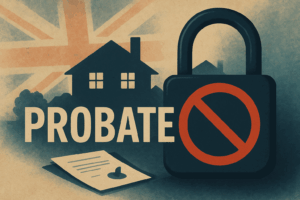Avoid probate in the UK to save your loved ones time, money, and stress after your passing.
This legal process can be lengthy, costly, and publicly accessible. That is why many families seek ways to bypass it through smart planning and legal tools.
This article answers key questions, including:
- What is probate in the UK?
- Is probate needed for joint accounts?
- How much is the threshold for probate UK?
- How to avoid probate UK after death?
- Can life insurance avoid probate UK?
If you are looking to invest as an expat or high-net-worth individual, which is what I specialize in, you can email me (hello@adamfayed.com) or WhatsApp (+44-7393-450-837).
This includes if you are looking for a free expat portfolio review service to optimize your investments and identify growth prospects.
Some facts might change from the time of writing. Nothing written here is financial, legal, tax, or any kind of individual advice, nor is it a solicitation to invest or a recommendation of any specific product or service.

Probate Definition
Probate is the legal process of validating a deceased person’s will and granting authority to manage and distribute their estate.
If there is a will, the executor named in the document applies for a “grant of probate.” If there is no will, a close relative applies for “letters of administration.”
When is probate required in the UK?
Probate is usually necessary if the deceased owned significant assets in their name alone, such as property, large bank accounts, or investments.
Financial institutions may require probate before releasing funds.
It may not be needed if:
- All assets were held in joint names.
- The estate is small (thresholds vary by bank).
What Is the Amount That Triggers Probate in the UK?
There’s no single fixed threshold across the UK that automatically triggers probate.
Instead, whether probate is required often depends on the value of the estate and the policies of financial institutions holding the deceased’s assets.
- Typical threshold: Most banks and financial institutions set their own limits, usually less than £5,000. If the deceased held more than this amount in a single account or institution, probate may be required before releasing the funds.
- Asset type matters: Probate is more likely needed if the deceased owned:
- Property or land in their sole name
- Substantial investments
- Business assets not held in joint ownership
It’s important to check with each institution involved in the estate, as thresholds and requirements can vary widely.
What Is the Best Way to Avoid Probate in the UK?

Avoiding probate in the UK can save your heirs time, money, and stress.
With the right estate planning tools, you can ensure certain assets pass directly to beneficiaries, bypassing the lengthy probate process.
Here are some of the most effective strategies:
Joint Ownership
Can you settle an estate without probate in the UK? Holding property or bank accounts as joint tenants (not tenants in common) means the asset automatically transfers to the surviving owner when one person dies.
This is one of the simplest ways to avoid probate, but it’s important to ensure the joint ownership is correctly documented.
Do You Need Probate If Everything Is in Joint Names?
Since assets of concern pass automatically to the surviving co-owner, it typically goes without probate.
This is known as the right of survivorship.
- Exceptions to be aware of:
- If the asset is held as tenants in common, each person owns a distinct share, which may require probate.
- Some financial institutions may still require a grant of probate for administrative reasons if large sums are involved or documentation is unclear.
- Probate may also be needed if other assets not held jointly exist in the estate.
Joint ownership can simplify inheritance, but it’s not a blanket exemption from probate; details and documentation matter.
Set Up a Trust
Transferring assets into a trust while you’re alive allows them to be managed and distributed outside of your estate.
Revocable or irrevocable trusts can be tailored to your goals.
Trusts can be especially useful for complex estates, blended families, or cross-border planning.
They offer privacy, continuity, and in many cases, probate avoidance.
Designated Beneficiaries
Certain financial products like pensions and some investment accounts let you name a beneficiary.
Upon death, these assets are paid directly to the named individual without becoming part of the probate estate.
Regularly updating these designations is key, especially after major life events such as marriage, divorce, or the birth of a child.
Does Life Insurance Go Through Probate in the UK?
Life insurance can often bypass probate in the UK, but this depends on how the policy is structured:
- When Life Insurance Bypasses Probate: If a valid beneficiary is named on the policy, the proceeds are typically paid directly to that person and do not form part of the deceased’s estate. This means the funds are not subject to probate delays or legal fees.
- If No Beneficiary Is Named: When a beneficiary isn’t specified or if the beneficiary has passed away and no alternate is listed, the payout becomes part of the estate. In that case, it may be subject to probate, delaying distribution and possibly affecting the tax position of the estate.
- Keep Beneficiary Designations Updated: To ensure your life insurance remains outside of probate, regularly review and update beneficiary details. This is especially important after major life changes such as marriage and the birth of a child. Also, consider naming contingent (backup) beneficiaries.
- Consider Investment-Linked Life Policies: Some individuals opt for life insurance products that also serve as long-term investment vehicles. These policies not only offer death benefits but may also build cash value over time. When structured correctly and held outside the estate, they can help avoid probate while preserving and growing wealth for beneficiaries.
With the right planning, life insurance can be a powerful tool for providing swift, tax-efficient support to your heirs without the complications of probate.
FAQs About Avoiding Probate in the UK
Can You Refuse Probate?
An executor can choose to decline or delay applying for probate, but this decision has important consequences:
- If an Executor Declines: When an appointed executor refuses the role, they must formally renounce their position. The court will then allow an alternate executor, usually a beneficiary or a close relative, to step in and apply for probate.
- Delays in Applying: If an executor delays the application without a valid reason, it can hold up the entire estate settlement process. This may cause frustration among beneficiaries and potential legal challenges.
- Alternatives: In cases where no executor is willing or able to act, an administrator can be appointed by the probate registry to manage the estate. This person often is a close family member or a professional appointed by the court.
- Legal Consequences: Executors have a legal duty to act in the estate’s best interest. Unreasonable refusal or delay can lead to legal action from beneficiaries to compel probate or replace the executor.
Refusing probate isn’t a decision to take lightly, so executors should seek legal advice before declining or postponing the process.
Can You Sort Out Probate Yourself?
Yes, it’s entirely possible to handle probate on your own in the UK. This is known as “DIY probate.”
Many people choose this route, especially when the estate is straightforward and there are no disputes among beneficiaries.
When DIY Probate Is Possible:
- The estate is small and uncomplicated.
- There’s a valid will in place.
- Assets are all located in the UK.
- There are no inheritance tax issues or foreign elements.
When You Should Consider Hiring a Solicitor:
- The estate is large, complex, or includes foreign assets.
- There’s no will (intestacy).
- There are potential disputes among beneficiaries.
- Inheritance tax is due or calculations are unclear.
Pros of DIY Probate:
- Cost savings on legal fees.
- Greater control over the process.
- Can be manageable with simple estates and proper guidance.
Cons of DIY Probate:
- Time-consuming and administratively demanding.
- Risk of legal or financial errors, especially with tax forms.
- You could be held personally liable for mistakes as an executor.
If you choose to go the DIY route, it’s essential to understand your responsibilities thoroughly or at least seek initial advice to ensure you’re on the right track.
Why Do You Have to Wait 6 Months After Probate?
The six-month waiting period after probate is a legal safeguard designed to protect the estate and its beneficiaries. During this time:
- Claims Against the Estate: Creditors, dependents, or others with a legal interest have up to six months to make claims against the estate, such as debts, unpaid taxes, or disputes over the will.
- Impact on Estate Distribution: Executors typically wait until this period ends before distributing assets to heirs to ensure all valid claims are settled. This helps prevent beneficiaries from having to return assets if a claim arises later.
This waiting period balances the timely administration of the estate with protecting the rights of all parties involved.
What Should You Never Put in Your Will in the UK?
While a will is a crucial part of estate planning, including the wrong types of assets or instructions can create confusion or delay probate.
Certain assets and designations are better handled outside of a will because they follow separate legal processes or ownership rules.
1. Jointly Owned Property:
Including property held as “joint tenants” in your will can create conflicts or misunderstandings, especially if ownership type isn’t clearly documented.
2. Pension and Life Insurance Beneficiaries:
Pensions and life insurance policies typically have named beneficiaries, and these designations take precedence over anything written in a will. Listing them again in your will can lead to contradictions, especially if the designations aren’t updated.
3. Assets in a Trust:
If you’ve placed assets into a trust, they are no longer part of your estate and shouldn’t be included in your will. Attempting to do so can undermine the purpose of the trust and create legal complications.
4. Conditional Gifts that Violate Law or Ethics:
Wills should not include conditions that are illegal or impossible to enforce, such as gifts contingent on marriage, religion, or lifestyle choices.
5. Funeral Instructions:
Since wills are often read after a funeral has taken place, it’s better to leave funeral wishes in a separate document and share it with loved ones ahead of time.
Conclusion
Avoiding probate in the UK requires thoughtful planning, especially when dealing with larger estates or complex family situations.
Key strategies include holding assets in joint names, setting up trusts, and using designated beneficiaries for life insurance and pensions.
In some cases, smaller estates may avoid probate altogether.
While DIY probate is possible, professional guidance can prevent costly mistakes and delays.
Planning ahead not only saves time and money. It also protects your loved ones from unnecessary legal hurdles during an already difficult time.
Pained by financial indecision?

Adam is an internationally recognised author on financial matters with over 830million answer views on Quora, a widely sold book on Amazon, and a contributor on Forbes.



